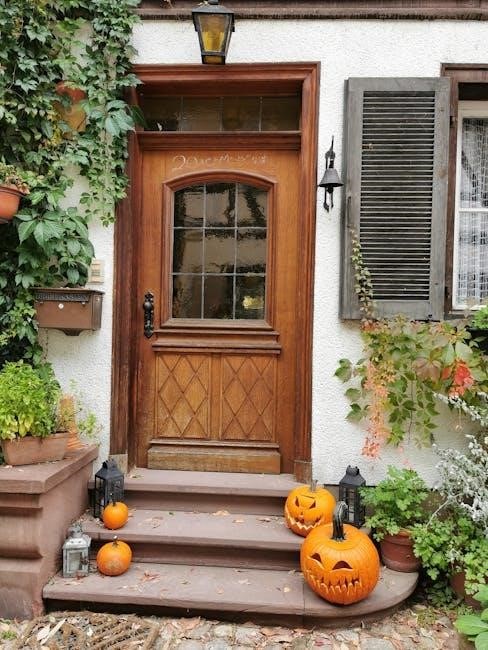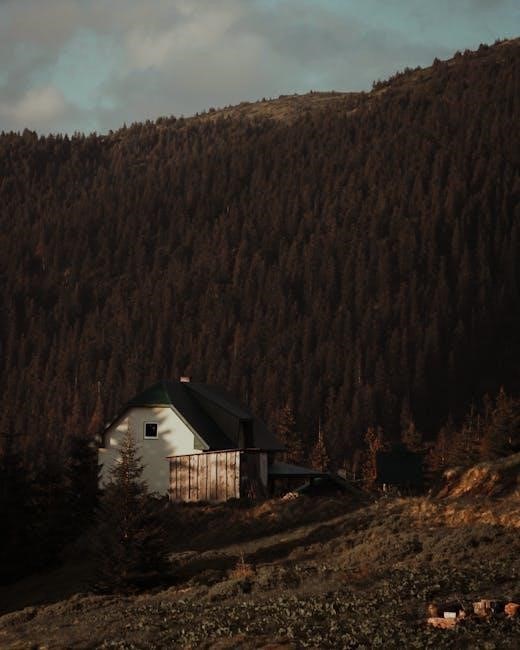the fall of house of usher pdf
Edgar Allan Poe‚ a 19th-century American writer‚ is renowned for his Gothic and horror themes‚ influencing literature globally. His works‚ like “The Fall of the House of Usher‚” explore psychological depth and atmospheric settings‚ leaving a lasting legacy in both horror and mystery genres.
1.1. Biography of Edgar Allan Poe
Edgar Allan Poe (1809-1849) was a celebrated American writer‚ poet‚ and critic. Born in Boston‚ he experienced tragedy early with his mother’s death at 24. Adopted by the Allan family‚ he later attended the University of Virginia and served in the U.S. Army. Poe’s literary career flourished with works like “The Raven” and “The Fall of the House of Usher‚” blending mystery and horror. His mysterious death in 1849 remains a subject of speculation‚ mirroring the dark themes of his writing.
1.2. Poe’s Contribution to Gothic Literature
Edgar Allan Poe is a cornerstone of Gothic literature‚ known for exploring themes of madness‚ death‚ and the supernatural. His works‚ such as “The Fall of the House of Usher‚” introduced psychological complexity and atmospheric horror‚ setting a benchmark for the genre. Poe’s mastery of suspense and eerie settings has influenced countless authors‚ solidifying his legacy as a pioneer in both Gothic and horror traditions.
Overview of “The Fall of the House of Usher”
Published in 1839‚ “The Fall of the House of Usher” is a Gothic horror tale by Edgar Allan Poe‚ exploring themes of madness‚ fear‚ and decay through a mysterious narrative.
2.1. Publication History and Background
“The Fall of the House of Usher” was first published in September 1839 in Burton’s Gentleman’s Magazine. This gothic short story by Edgar Allan Poe explores themes of decay‚ madness‚ and supernatural elements‚ solidifying Poe’s reputation as a master of horror. The tale has since become a cornerstone of American literature‚ widely studied and admired for its atmospheric depth and psychological complexity‚ remaining accessible today as a free PDF download.
2.2. Plot Summary and Key Events
The narrator visits his childhood friend‚ Roderick Usher‚ at his decaying mansion. Roderick‚ suffering from an unknown illness‚ believes his house is alive and evil. His twin sister‚ Madeline‚ is also ill and later appears to die. Roderick entombs her in the house‚ but strange noises suggest she may still be alive. A storm strikes‚ and the house collapses as Madeline appears‚ embracing Roderick‚ who dies. The narrator flees as the house sinks into darkness.

Major Themes in “The Fall of the House of Usher”
This gothic tale explores themes of mental illness‚ family legacy‚ and the supernatural. The decaying mansion mirrors the characters’ psychological unraveling‚ symbolizing inescapable doom and cosmic despair.
3.1. Mental Illness and Psychological Decay
Roderick Usher’s mysterious ailment and his sister Madeline’s fatal disease reflect the crumbling psyche of the Usher family. The narrator’s growing unease mirrors the oppressive atmosphere‚ emphasizing the intertwined fates of the siblings and the house. Madness and physical decay are central‚ highlighting Poe’s exploration of the mind’s fragility and the blurred lines between reality and illusion‚ creating a chilling portrait of psychological disintegration.
3.2. Family Legacy and Inescapable Doom
The Usher family’s cursed heritage traps Roderick and Madeline in a cycle of inevitable destruction. Their ancestral home‚ with its decaying walls‚ symbolizes the family’s decline. The story underscores the inescapability of fate‚ as the siblings’ attempts to escape their destiny ultimately lead to their downfall. Poe masterfully portrays how inherited sins and a dark legacy condemn the Usher lineage to an irrevocable and tragic conclusion‚ leaving no hope for redemption or survival.
Analysis of Main Characters
Roderick Usher‚ a mentally fragile aristocrat‚ struggles with psychological turmoil‚ while his sister Madeline suffers from mysterious physical ailments. The narrator‚ a childhood friend‚ witnesses their descent into madness‚ symbolizing the darker aspects of human nature and familial bonds.
4.1. Roderick Usher: The Tormented Aristocrat
Roderick Usher‚ the enigmatic master of the crumbling mansion‚ embodies psychological turmoil and decay. His fragile mental state‚ marked by heightened sensitivity and irrational fears‚ reflects the dark undertones of his family’s legacy. Physically weak and emotionally unstable‚ Roderick believes his house is alive‚ exacerbating his paranoia. His obsession with madness and death‚ along with his artistic expressions‚ underscores his internal struggle‚ making him a tragic figure consumed by his own psyche.
4.2; The Narrator: A Witness to Horror
The unnamed narrator‚ an old friend of Roderick Usher‚ serves as the story’s voice‚ recounting his eerie visit to the House of Usher. His rational perspective juxtaposes the supernatural events‚ grounding the tale in reality. The narrator’s emotional response to the decaying mansion and its inhabitants amplifies the sense of dread. However‚ his inability to fully comprehend or intervene in the horrors he witnesses underscores his helplessness‚ mirroring the reader’s own unease.
The Role of Setting in the Story
The isolated‚ decaying House of Usher creates an ominous atmosphere‚ mirroring Roderick’s mental turmoil. Its crumbling structure and eerie surroundings amplify the sense of dread and inescapable doom.
5.1. The Atmosphere of the House of Usher
The House of Usher exudes a gloomy‚ oppressive atmosphere‚ with its decaying structure and dark‚ soundless surroundings. The low-hanging clouds and evening shadows amplify the sense of dread‚ creating an inescapable feeling of impending doom. The eerie setting mirrors Roderick’s psychological state‚ immersing the narrator in a world of fear and foreboding.
5.2. Symbolism of the Decaying Mansion
The decaying mansion symbolizes the crumbling psyche of Roderick Usher and the decline of his family legacy. Its cracked walls and fading grandeur mirror Roderick’s mental instability and the inescapable doom that haunts the Usher lineage; The house’s isolation and eerie appearance evoke a sense of dread‚ reflecting the dark themes of madness‚ decay‚ and the inevitability of destruction that permeate the narrative.
Symbolism and Metaphors
The decaying mansion symbolizes the crumbling Usher family legacy and Roderick’s fractured psyche‚ while its eerie atmosphere foreshadows the inevitable collapse of both the house and its inhabitants.
6.1. The House as a Reflection of Roderick’s Psyche
The decaying House of Usher mirrors Roderick’s mental instability‚ with its crumbling walls and dark atmosphere symbolizing his inner turmoil. The structure’s eerie silence and oppressive gloom reflect his growing madness and existential fears. Physically‚ the house’s decay parallels Roderick’s psychological deterioration‚ emphasizing his inability to escape his dark destiny. Both the house and its owner are consumed by an irreversible descent into chaos and destruction.
6.2. The Importance of Art and Music in the Narrative
Art and music play pivotal roles in “The Fall of the House of Usher‚” reflecting Roderick’s fragile psyche. His creations‚ such as the song “The Haunted Palace‚” mirror his spiraling madness‚ while the house itself serves as a decaying masterpiece. These elements amplify the gothic atmosphere‚ symbolizing the interplay between beauty and horror‚ and underscore the inescapable doom that permeates the Usher family’s tragic fate.

Availability of “The Fall of the House of Usher” in PDF Format
The story is widely available as a free PDF download from reliable sources like Lit2Go‚ Project Gutenberg‚ and various educational platforms‚ ensuring easy access for readers worldwide.
7.1. Free PDF Downloads from Reliable Sources
Edgar Allan Poe’s “The Fall of the House of Usher” is freely available in PDF format from reputable sources such as Lit2Go‚ Project Gutenberg‚ and educational platforms. These sites offer high-quality‚ downloadable versions of the story‚ ensuring easy access for readers worldwide. Additionally‚ many platforms provide the text in EPUB and MOBI formats‚ catering to various e-readers and devices. These free resources are ideal for students‚ researchers‚ and literature enthusiasts seeking to explore Poe’s timeless masterpiece.
7.2. E-Book Platforms and Audiobook Versions
“The Fall of the House of Usher” is widely available on popular e-book platforms like Amazon Kindle‚ Google Play Books‚ and Apple Books. Audiobook versions can be found on Audible‚ Libby‚ and Scribd‚ offering immersive narrations. These formats ensure the story is accessible to modern readers‚ catering to diverse preferences and reading habits. E-books and audiobooks provide convenience for those who enjoy consuming literature digitally or on-the-go.
Adaptations and Interpretations
Edgar Allan Poe’s “The Fall of the House of Usher” has inspired numerous adaptations‚ including films‚ stage plays‚ and modern reinterpretations. These versions keep the story’s eerie essence alive‚ captivating new audiences with fresh perspectives on Poe’s timeless tale.
8.1. Film and Stage Adaptations
Edgar Allan Poe’s “The Fall of the House of Usher” has been adapted into numerous films and stage plays. These adaptations capture the eerie atmosphere and psychological complexity of the original story. Films like the 1928 silent version and modern interpretations bring the crumbling mansion and its tormented inhabitants to life. Stage productions emphasize the dramatic tension‚ further immersing audiences in Poe’s haunting world. These adaptations ensure the story’s enduring relevance and appeal.
8.2. Modern Reinterpretations and Pop Culture References
Edgar Allan Poe’s “The Fall of the House of Usher” continues to inspire modern media. It influences music videos‚ films‚ and literature‚ with themes of madness and decay resonating in contemporary works. References appear in TV shows‚ video games‚ and even fashion‚ showcasing its timeless appeal. The story’s eerie atmosphere and psychological depth make it a favorite for reinterpretation‚ ensuring its legacy endures in popular culture.

Literary Significance and Cultural Impact
Edgar Allan Poe’s “The Fall of the House of Usher” is a cornerstone of Gothic literature‚ shaping the horror genre and influencing countless writers. Its exploration of madness‚ family decay‚ and atmospheric dread continues to captivate readers‚ solidifying Poe’s legacy as a master of dark storytelling and psychological insight.
9.1. Influence on Gothic and Horror Genres
Edgar Allan Poe’s “The Fall of the House of Usher” set a benchmark for Gothic and horror literature‚ influencing generations of writers. Its atmospheric terror‚ psychological complexity‚ and themes of madness and decay have shaped the genre. The story’s exploration of the darker aspects of human nature and its haunting setting have inspired countless adaptations and remain a cornerstone of horror‚ cementing Poe’s legacy as a master of the macabre.
9.2. Scholarly Analysis and Critical Reception
Scholars and critics have long praised “The Fall of the House of Usher” for its profound exploration of mental illness‚ family decay‚ and the supernatural. The story’s intricate symbolism‚ particularly the house mirroring Roderick’s psyche‚ has been widely analyzed. Critics highlight Poe’s masterful use of atmosphere and suspense‚ cementing the tale as a cornerstone of Gothic literature. Its enduring relevance continues to inspire academic study and modern interpretations of psychological and cultural symbolism.

Why “The Fall of the House of Usher” is Still Relevant Today
The story’s exploration of universal themes like fear‚ madness‚ and the human psyche continues to resonate. Its timeless themes of isolation and mental health remain deeply relevant today.
10.1. Universal Themes of Fear and Madness
Poe masterfully weaves fear and madness into the narrative‚ creating a haunting exploration of the human psyche. The decaying mansion mirrors Roderick’s deteriorating mind‚ evoking primal fears of isolation and the unknown. These themes transcend time‚ making the story a timeless classic that continues to captivate readers with its psychological complexity and eerie atmosphere. Its enduring relevance lies in its ability to tap into universal human anxieties.
10.2. Educational Value and Academic Study
“The Fall of the House of Usher” is a cornerstone of academic study‚ offering insights into Gothic literature‚ psychological complexity‚ and symbolic storytelling. Its exploration of mental illness‚ family dynamics‚ and the interplay of physical and emotional decay provides rich material for analysis. Educators often use the story to teach literary devices‚ themes‚ and critical thinking‚ making it a valuable resource for students of literature and psychology.
Edgar Allan Poe’s “The Fall of the House of Usher” remains a masterclass in Gothic horror‚ exploring madness‚ fear‚ and decay. Its haunting atmosphere and psychological depth ensure its enduring relevance‚ making it a must-read for literature enthusiasts and scholars alike.
11.1. Final Thoughts on the Story’s Enduring Legacy
Poe’s “The Fall of the House of Usher” endures as a cornerstone of Gothic horror‚ its haunting exploration of mental decay and familial doom captivating readers since 1839. Its influence permeates literature‚ film‚ and culture‚ ensuring its timeless relevance. Available in PDF and audiobook formats‚ it remains accessible for new generations‚ solidifying its legacy as a masterwork of psychological terror and atmospheric storytelling.
11.2. Encouragement to Read or Re-Read the Story
Reading or re-reading “The Fall of the House of Usher” offers a profound journey into psychological horror and atmospheric storytelling. Poe’s mastery of suspense and symbolism creates a haunting experience that lingers long after the final page. Accessible in PDF and audiobook formats‚ it invites both new readers and seasoned fans to explore its timeless themes of fear‚ madness‚ and the crumbling boundaries between reality and nightmare.
